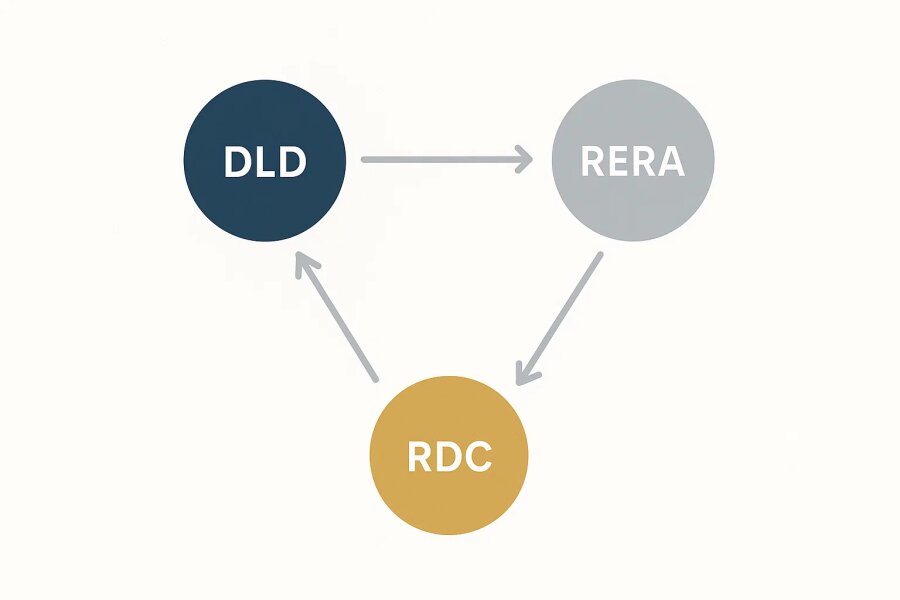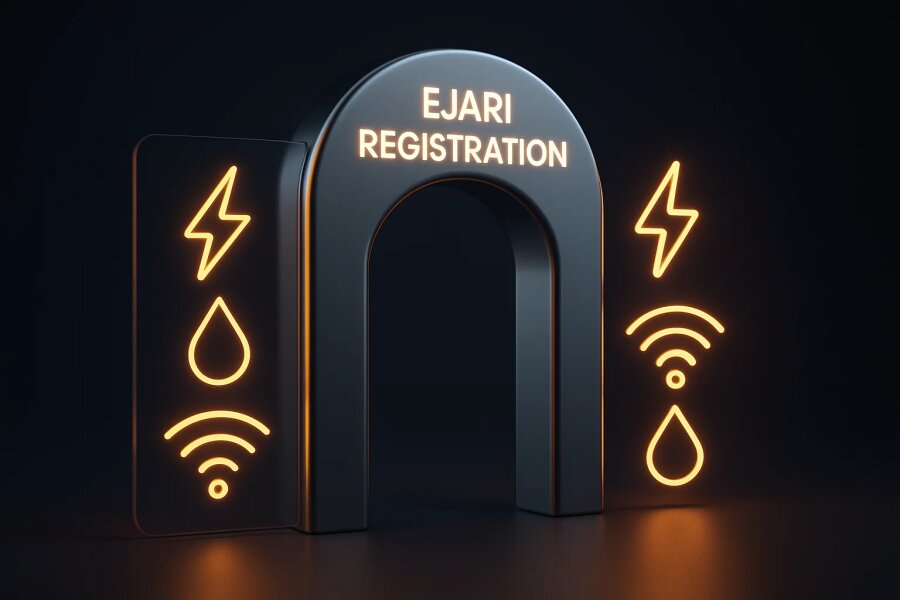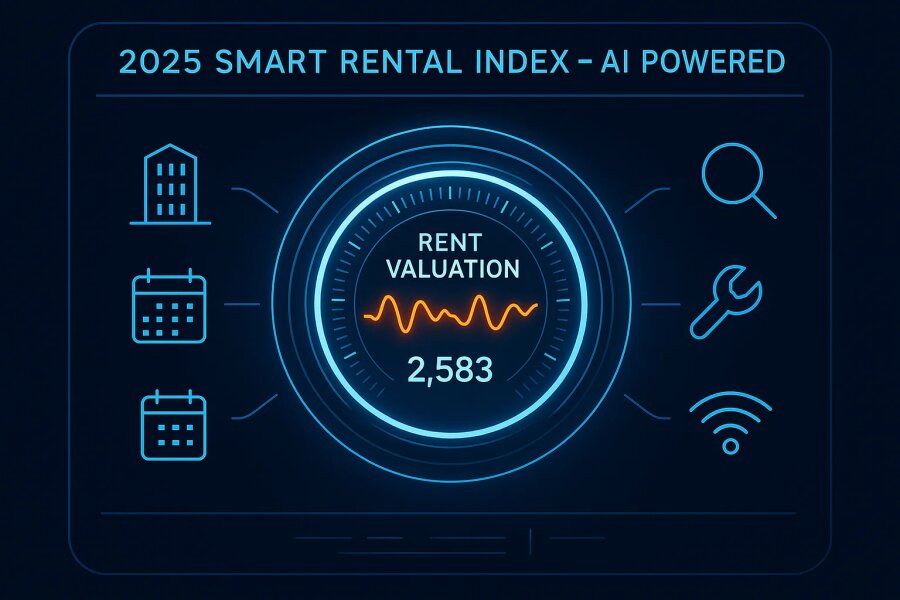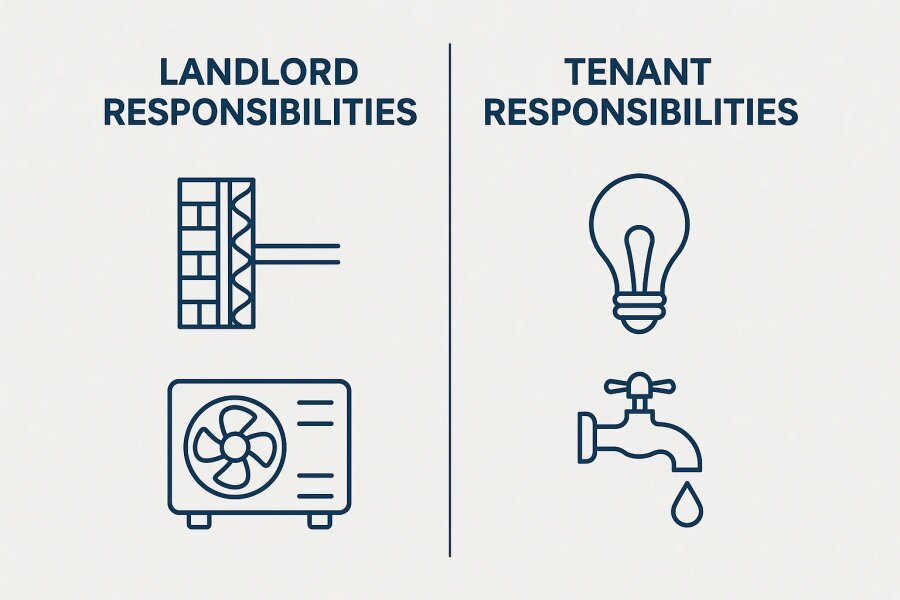Introduction: Navigating the 2025 Rental Market
Understanding Dubai's Regulatory Structure
- Dubai Land Department (DLD)
- Real Estate Regulatory Agency (RERA)
- Rental Disputes Center (RDC)
The Legal Framework: Laws No. 26 and 33
The Tenancy Agreement and Ejari Registration
- Mandatory Registration Requirements
- Automatic Renewal Provisions
The 2025 Smart Rental Index Revolution
- From Static Calculator to Dynamic AI System
- Star Rating System and Property Modifications
- Legal Framework for Rent Increases
Maintenance Responsibilities and Security Deposits
- Division of Maintenance Duties
- Security Deposit Regulations
Early Termination and Eviction Procedures
- Early Lease Termination
- Eviction During the Lease Term
- Eviction at Lease Expiry
Navigating the Dubai RDC Process
- Pre-Filing Considerations
- Filing Requirements and Documentation
- The Resolution Process
Best Practices for Landlords and Tenants
- Landlord Recommendations
- Tenant Protection Strategies
Conclusion: Navigating UAE Real Estate Disputes
Dubai's rental market continues to evolve in 2025, marked by sophisticated technological advancements and an increasingly transparent regulatory framework. For landlords and tenants navigating the complexities of UAE real estate disputes, understanding the legal landscape has become more critical than ever. This comprehensive guide explores the framework governing rental relationships, dispute resolution mechanisms, and strategic considerations for both parties operating in one of the world's most dynamic property markets.

Understanding Dubai's Regulatory Structure
The governance of rental law in the UAE, specifically in Dubai, operates through a sophisticated tripartite structure that ensures comprehensive oversight of the real estate sector. Each component plays a distinct yet interconnected role in maintaining market stability and protecting stakeholder rights.
Dubai Land Department (DLD)
Established in 1960, the Dubai Land Department serves as the foundational authority for all real estate transactions in the emirate. The DLD functions as the central registry and custodian of property records, maintaining the official title deed register that provides the single verifiable source of property ownership. Its responsibilities extend beyond administrative functions to include managing Ejari, the mandatory online portal for registering all tenancy contracts.
Real Estate Regulatory Agency (RERA)
Operating as the regulatory arm of the DLD, RERA oversees policy implementation and market practices. The agency's mandate includes licensing real estate professionals and ensuring compliance with established regulations. Most notably, RERA has developed and now maintains the AI-powered Smart Rental Index, which fundamentally transformed how rental valuations are determined in 2025.
Rental Disputes Center (RDC)
The Dubai RDC, established by Decree No. 26 of 2013, serves as the specialized judicial arm dedicated exclusively to resolving tenancy contract disputes in Dubai. Unlike traditional courts, the RDC provides a streamlined, specialized mechanism for dispute resolution with a strong emphasis on mediation before litigation.

This integrated structure creates a closed-loop regulatory system where data collection, policy formulation, and enforcement work seamlessly together. The mandatory Ejari registration feeds real-time data to RERA's Smart Rental Index, while the RDC has direct access to official contract records when adjudicating disputes.
The Legal Framework: Laws No. 26 and 33
The primary legislation governing property law in the UAE's rental sector consists of Law No. 26 of 2007, as amended by Law No. 33 of 2008. This framework strikes a careful balance between landlord rights and tenant protections, creating legal certainty in one of the region's most dynamic markets.
The 2008 amendment refined critical provisions regarding eviction procedures and rent increase mechanisms. These laws establish clear parameters for both parties, ensuring landlords can profit from their investments while protecting tenants from arbitrary actions.
For complex legal matters requiring professional guidance, consulting with experienced real estate lawyers in Dubai can help navigate the intricacies of this regulatory framework.
The Tenancy Agreement and Ejari Registration
Mandatory Registration Requirements
Dubai law mandates that all rental relationships be governed by written lease contracts registered through the Ejari system. This requirement isn't merely administrative; an unregistered contract is legally unenforceable before the RDC. Without Ejari registration, parties effectively have no access to legal recourse in case of disputes.
The Ejari certificate serves multiple critical functions beyond dispute resolution. Tenants require valid Ejari documentation to establish utility accounts with Dubai Electricity and Water Authority (DEWA), set up telecommunications services, and process residence visa applications or renewals for themselves and family members.
Automatic Renewal Provisions
Article 6 of Law No. 26 of 2007 provides important stability through automatic renewal provisions. When a lease expires and the tenant continues occupying the property without landlord objection, the contract automatically renews for the same term or one year, whichever is shorter, under identical conditions.
Either party wishing to modify terms or decline renewal must provide written notice at least 90 days before contract expiry. Failure to provide this notice means the contract continues unchanged, protecting both parties from sudden disruptions.

The 2025 Smart Rental Index Revolution
From Static Calculator to Dynamic AI System
The introduction of the AI-powered Smart Rental Index in 2025 represents a paradigm shift in rental valuations. Unlike the previous annually updated calculator that provided broad benchmarks, the new system analyzes over 60 different criteria including building quality, amenities, maintenance standards, and unit-specific features.
This dynamic tool draws on live data from Ejari registrations, ensuring valuations reflect real-time market conditions rather than static annual surveys. The system's continuous updates provide unprecedented accuracy in determining fair market rent.

Star Rating System and Property Modifications
The Smart Index assigns each property a transparent 1-5 star rating that directly impacts official rental valuations. Significantly, 2025 regulations now mandate that landlords declare any property modifications or upgrades within the Ejari system before issuing or renewing contracts.
This creates direct incentives for property improvement. Documented upgrades can improve star ratings and legally justify higher rents, while undeclared improvements restrict landlords to previous valuation benchmarks. The system transforms property ownership from passive rent collection to active asset management.
Legal Framework for Rent Increases
Despite technological advances, the underlying legal framework from Decree No. 43 of 2013 remains in place. The maximum allowable increase depends on how current rent compares to the Smart Index average:
- Less than 10% below average: 0% increase permitted
- 11-20% below: Maximum 5% increase
- 21-30% below: Maximum 10% increase
- 31-40% below: Maximum 15% increase
- Over 40% below: Maximum 20% increase
The mandatory 90-day written notice requirement for any rent increase remains non-negotiable for enforcement.
Maintenance Responsibilities and Security Deposits
Division of Maintenance Duties
Article 16 of Law No. 26 of 2007 establishes that landlords bear responsibility for maintenance affecting the property's intended use unless parties agree otherwise. Standard practice divides responsibilities as follows:
Major maintenance remains the landlord's responsibility, covering structural repairs and core systems like central air conditioning, water heaters, and fundamental plumbing. Tenants handle minor maintenance including routine upkeep like changing bulbs, fixing minor leaks, and clearing blocked drains.
Many contracts establish monetary thresholds between AED 500-1,000 to distinguish minor from major repairs. Tenant-caused damage remains the tenant's responsibility regardless of cost.
Security Deposit Regulations
Security deposits typically equal 5% of annual rent for unfurnished properties and 10% for furnished units. Landlords must refund deposits when leases expire and properties are returned, minus legitimate deductions for damages beyond normal wear and tear or outstanding utility bills.
The distinction between "wear and tear" and "damage" frequently causes disputes. Normal deterioration from everyday use cannot justify deductions, but tenant-caused damage can. Without precise legal definitions, the RDC evaluates cases based on evidence presented, making thorough documentation through photos and inspection reports crucial for both parties.

Early Termination and Eviction Procedures
Early Lease Termination
Article 7 of Law No. 26 of 2007 establishes that valid tenancy contracts bind both parties and cannot be unilaterally terminated. Early termination requires either an exit clause in the contract or mutual written agreement.
Without an exit clause, tenants technically breach contracts by leaving early. Market convention has developed around one to two months' rent as standard compensation, though this remains negotiable based on market conditions and the landlord's ability to find replacement tenants.
Eviction During Lease Term
Landlords may evict tenants during the lease term only for significant breaches outlined in Article 25(1) of Law No. 33 of 2008, including non-payment after 30 days' written notice, unauthorized subletting, illegal property use, dangerous alterations, or misuse contrary to the lease purpose.
Eviction at Lease Expiry
Even upon lease expiry, landlords cannot arbitrarily refuse renewal. Article 25(2) permits eviction only for four specific reasons:
- Personal use by the owner or first-degree relatives
- Property sale
- Demolition for reconstruction with proper permits
- Major renovation requiring vacancy
All these grounds require 12 months' written notice served via Notary Public or Registered Mail. Standard emails or verbal notices have no legal validity.
A crucial 2024 clarification established that valid 12-month eviction notices for property sales remain enforceable after ownership transfers, providing transaction certainty while maintaining tenant protection periods.
Navigating the Dubai RDC Process
Pre-Filing Considerations
Before initiating formal proceedings, the RDC encourages amicable resolution. Good-faith negotiations can save considerable time and expense. Maintaining written records of all communication attempts provides valuable evidence if disputes escalate.
Filing Requirements and Documentation
Cases can be filed online through the DLD website or at authorized Real Estate Services Trustee offices. The filing fee equals 3.5% of annual rent, with minimums typically at AED 500 and maximums reaching AED 15,000 for financial claims or AED 20,000 for eviction cases.
Essential documentation includes the original tenancy contract, Ejari certificate, identification documents, title deeds (for landlords), and all relevant supporting evidence like rent payment records, correspondence, and property condition documentation.
The Resolution Process
Every case first enters the Conciliation Department for mediation aimed at reaching mutually agreeable settlements within 15 days. Recent data shows increasing speed and efficiency, with average settlement periods of just six days in Q2 2025.
Failed mediations proceed to First Instance Committees for formal adjudication, typically concluded within 30 days. Either party may appeal judgments exceeding AED 100,000 within 15 days. Exceptional cases involving high values or significant legal points may reach the Court of Cassation.
The RDC's Judgment Execution Department handles enforcement of final decisions, ensuring practical implementation of court orders.
For those facing complex disputes, seeking guidance from qualified real estate lawyers in Abu Dhabi or Dubai can significantly improve outcomes.
Best Practices for Landlords and Tenants
Landlord Recommendations
Success in UAE real estate disputes often depends on proactive compliance and documentation. Landlords should embrace active asset management, leveraging the Smart Rental Index by investing in documented improvements that enhance star ratings and justify rent increases.
Procedural correctness proves critical, especially regarding eviction notices. The 12-month notice requirement demands perfect execution through proper channels with complete documentation. Thorough tenant screening, including checking RDC Rental Good Conduct Certificates, prevents future disputes.
Detailed move-in and move-out inspections with photographic documentation create agreed baselines for property condition, protecting against unsubstantiated claims.
Tenant Protection Strategies
Tenants should prioritize comprehensive move-in inspections, creating detailed photographic and video records immediately shared with landlords to establish time-stamped property condition baselines.
Understanding renewal and eviction rights prevents exploitation. Landlords cannot arbitrarily increase rent or refuse renewal without valid reasons and proper notice. All important communications should be documented in writing, creating evidence trails for potential disputes.
Crucially, tenants should never withhold rent during disputes, as this provides grounds for eviction. Instead, continue payments while filing RDC cases to compel landlord compliance with obligations.
Navigating UAE Real Estate Disputes
Dubai's 2025 rental landscape reflects sophisticated evolution in regulatory frameworks and technological integration. The combination of established laws, the revolutionary Smart Rental Index, and the efficient RDC creates a balanced ecosystem protecting both landlord investments and tenant stability.
Success in this environment demands thorough understanding of legal requirements, meticulous documentation practices, and strict procedural compliance. The system rewards preparation and punishes oversight, making the party with clearer, more complete documentation likely to prevail in disputes.
While the framework provides robust protections and clear pathways for resolution, complex situations often benefit from professional legal guidance. The integration of AI-powered valuations, mandatory digital registration, and specialized dispute resolution mechanisms positions Dubai's rental market among the world's most transparent and efficient, supporting the emirate's continued growth as a global investment destination.
The key to thriving in this market lies not in confrontation but in understanding rights, fulfilling obligations, and maintaining comprehensive documentation throughout the rental relationship. With proper knowledge and preparation, both landlords and tenants can navigate Dubai's rental landscape confidently and successfully.
Frequently Asked Questions (FAQs)
How do I resolve a rental dispute in Dubai?
If you have a dispute with your landlord or tenant, you should first attempt to resolve it amicably. If that fails, you must file a case with the Rental Disputes Center (RDC). The process involves filing a complaint (online or at a Trustee office), paying a fee (3.5% of the annual rent), and first attending a mandatory mediation session. If mediation doesn't work, the case proceeds to a formal judgment.
What happens if I disagree with my rent increase?
Your landlord must give you 90 days' written notice before the lease expires if they intend to raise the rent. The increase must comply with the caps set by the Smart Rental Index. If you disagree with the increase (e.g., it's above the legal limit or you didn't receive proper notice), you should not sign the new contract. Continue paying your original rent and file a "contract renewal" dispute at the RDC to have them set the fair rent.
Can my landlord evict me when my lease expires?
No, a landlord cannot arbitrarily refuse to renew your lease. They can only evict you at lease expiry for four specific reasons: (1) the owner needs the property for personal use, (2) the property is being sold, (3) the property requires demolition, or (4) the property needs major renovations that require it to be vacant. In all four cases, the landlord must provide you with 12 months' written notice served via Notary Public or Registered Mail.
What are the penalties if I need to terminate my lease early?
A tenancy contract is binding on both parties. If your contract does not contain an "exit clause" specifying a penalty, you cannot unilaterally terminate it. You must get your landlord's mutual agreement. While not law, the common market custom is often a penalty of one to two months' rent, but this is negotiable.
Who is responsible for maintenance in my apartment?
The law states the landlord is responsible for major maintenance that affects the property's intended use (e.g., structural issues, central AC, water heaters). The tenant is typically responsible for minor maintenance (e.g., changing lightbulbs, fixing minor leaks). Many contracts set a financial threshold (e.g., AED 500) to distinguish between the two. The tenant is always responsible for any damage they cause.
My landlord won't return my security deposit. What can I do?
The landlord is required to refund your security deposit at the end of the lease, minus any legitimate deductions for damage (which is different from normal "wear and tear"). If the landlord unjustly withholds your deposit, you can file a case at the RDC to claim it. Having a detailed move-in inspection report with photos is crucial evidence in such disputes.



